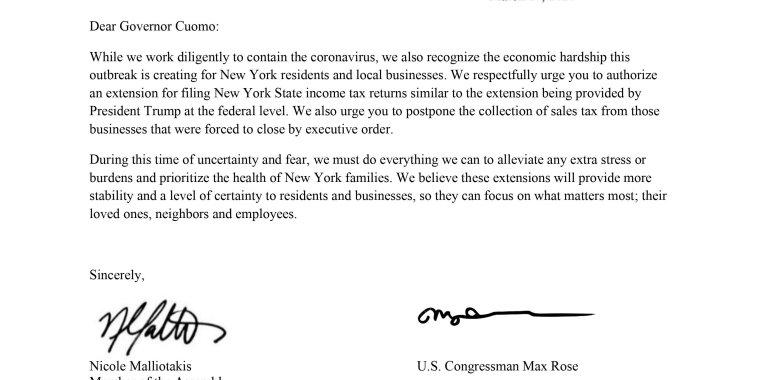
Senate Passes Job Creation Plan
The New York State Senate today passed economic development legislation (S.8798), that will create new jobs, revitalize communities and encourage young people to stay in New York State.
The Senate plan includes new, job creating tax cuts for small businesses and manufacturers that will make them more competitive. In addition, the plan would provide tax credits tied to the creation of new jobs; would reduce unnecessary, costly and burdensome government regulations, provide tax credits and interest-free loans to students who stay in New York State, and encourage new investments in community revitalization. The components of the plan will be offered prospectively – the Senate recognizes the importance of not taking away benefits from companies that have made decisions based on those benefits.
Last week, the federal Bureau of Labor Statistics announced that November had the worst single-month job loss in 34 years, with more than 533,000 workers losing their jobs throughout the nation, and the unemployment rate, at 6.7 percent, is the highest it’s been since 1993. Overall, more than 1.2 million jobs have been lost in the past three months.
New York State currently has a $1.5 billion deficit, which is expected to reach as high as $12.5 billion next year. When faced with a similar crisis thirteen years ago, the Senate acted aggressively to close the deficit by cutting state spending and taxes – resulting in a balanced budget, generated surpluses, and marked the beginning of a period of unprecedented job growth in New York State.
“During these difficult economic times, people throughout the state are worried about keeping their jobs and their financial security – as we learned in the past, it is critically important that we do not raise taxes or make harmful decisions that will impede economic growth and further worsen the current economic condition,” Senator Lanza said. “This is a strong, commonsense plan of action that will help create new job opportunities and keep current jobs from leaving New York. With this plan we are taking the next step towards a more effective and accountable way to help businesses grow and create jobs.”
Highlights of the Senate’s job creation plan include:
> Cut taxes on small businesses in half and eliminate business taxes for small manufacturers;
> Create new tax credits tied to job creation and job training by manufacturers;
> Help small businesses obtain loans to grow;
> Reduce health insurance costs for small businesses;
> Expand tax credits for investments by emerging technology businesses;
> Provide low cost student loans and create a tax credit program for students who go to college in New York and stay in New York;
> Eliminate state regulations, red tape and paperwork; and
> Give local governments greater authority to provide tax breaks for community and neighborhood revitalization projects.
Creating Economic Opportunity
> Small Business & Manufacturing Tax Cuts
The Senate plan includes broad based, statewide tax reductions and redirected state investments that will lower the cost of doing business, level the playing field for existing businesses and help small businesses and manufacturers grow and create new jobs
In the first year of the Senate plan, the corporate franchise tax would be cut in half for businesses with 20 employees or less or not more than $1 million in net income. In the following year, the business tax would be completely eliminated for small manufacturers. This would reduce corporate taxes for all small businesses by $25 million the first year and cut taxes by an additional $15 million for all small manufacturers in the following year.
This tax cut would particularly benefit main street businesses, existing small manufacturers, small start-ups and high technology companies. New York State has 18,500 technology companies with an average of 16 employees. There are a total of more than 427,000 small businesses in New York that employ more than 3.9 million people.
> IMAJIN Manufacturing Tax Credit
The Senate’s plan would create an Integrated Manufacturing Jobs and Investment Credit (IMAJIN), reducing state taxes on manufacturers by $130 million a year by providing manufacturers incentives for creating new jobs and providing job training and making new investments. If the investments accompany employment and/or training, the credits could be integrated to make them refundable. These benefits would help prevent “outsourcing” and keep jobs in New York.
The IMAJIN initiative includes:
> A payroll tax credit to manufacturing employers based upon the creation of new jobs. The credit would be equal to 90 percent of the amount of personal income taxes generated from those new jobs;
> A 50 percent employee skills job training credit; and
> A 15 percent Manufacturers Investment Tax Credit (MITC) that could be combined with either the payroll credit or the training credit to get a refundable credit.
The IMAJIN credit will not only help traditional manufacturers, but farmers would be eligible for the IMAJIN credits as well. Farmers would be offered assistance so they can make investments to ensure the future of our state’s largest industry.
> Small Businesses Loans to Create Opportunity
In order to remain competitive in today’s global market established companies, regardless of their industry, must think like start-ups, designing cutting edge products, seeking new markets or overhauling inefficient processes. The current credit crisis is making it more difficult than ever for businesses to get the capital needed to grow and remain competitive. To assist businesses, the Senate would work with the Executive to determine the best method to accomplish this goal.
> Easing Small Business Health Insurance Costs
The high cost of providing health insurance to employees is a primary concern of small businesses. The Senate plan includes four reforms that would employ a market-based approach to expand access to affordable quality health care by reducing the cost of health insurance policies for small businesses:
> Expand Healthy NY from 208 percent of the Federal Poverty Level (FPL) to 250 percent of the FPL. This would make a family of four with annual net income of approximately $60,000 per year eligible for the program;
> Make Healthy NY available to all, but at an unsubsidized rate. Doing so would reduce health insurance costs for small businesses at no cost to the State because qualified businesses would be able to purchase streamlined health insurance policies, which could reduce premiums by up to 50 percent;
> Exempt high deductible health plans from State mandates, which would have the same effect as allowing insurers to offer Healthy NY at an unsubsidized rate; and
> Require the Department of Labor and the Department of State to study the costs and benefits of allowing businesses to create innovative and flexible heath coverage plans as authorized under Federal Statute.
> Expanded High Tech Investment
The existing Qualified Emerging Technology Credit is an innovative and successful way government can assist high technology businesses to create new jobs. The Senate proposal would remove the December 31, 2011 tax credit sunset date and increase the maximum credit that a company can claim for capital investment and research support from $250,000 to $400,000 per year. Emerging technology firms would receive an additional $20 million a year in reimbursed grants from the State.
> Eliminate Wasteful Regulations, Reduce Paperwork & Cut Red Tape
The Senate plan includes the creation of a Regulatory Reform and Competitiveness Commission to review all state regulations and their impact on the state’s businesses. The Commission would include representatives from the large and small business community, as well as local government and labor, and, similar to the Berger Commission, make a recommendation to the State Legislature of regulatory revisions that would become law, unless the State Legislature passed superseding legislation.
In addition, all agencies would be required to identify the economic impact and cost to business of any and all proposed new regulations.
> Tax Incremental Financing
To allow the private sector and municipalities the flexibility to build projects and infrastructure that accompanies major housing projects, this legislation would authorize municipalities to utilize tax increment financing as a method to finance affordable housing and infrastructure improvements necessary for the development of affordable housing.



